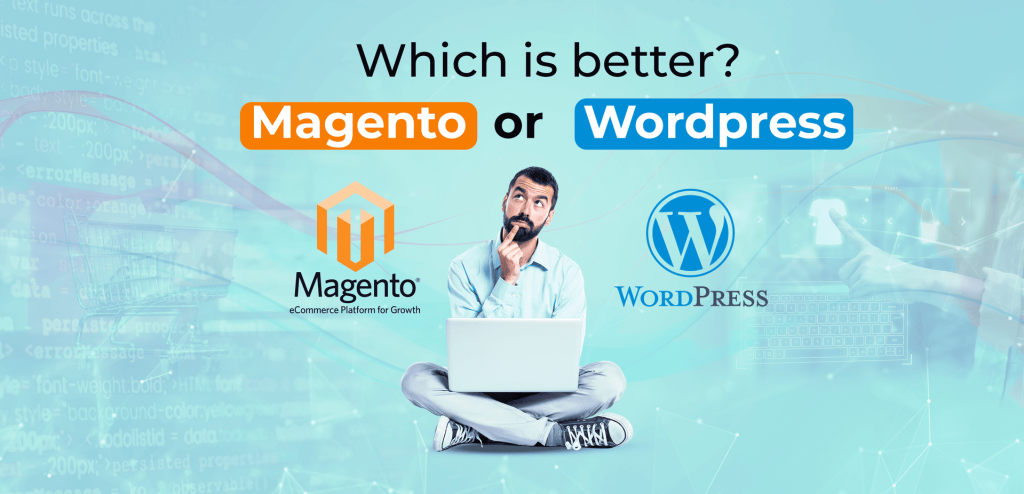Choosing an e-commerce platform is a very tough decision, especially when there are so many choices. Some of the challenges in this decision include:
- Platform Selection and Compatibility: Will the platform align with my business goals and budget, while being compatible with my existing systems (like inventory management and CRM)?.
- Scalability and Performance: As my business grows, can this platform scale?.
- User Experience and Design: Can the platform deliver an intuitive layout, responsive design, and effective navigation while maintaining brand identity?
- Security and Compliance: Will it be secure and compliant with standards like GDPR or PCI DSS?
Let us do a deep dive into the strengths and weaknesses of Magento and WordPress, providing you with the insights you need to make the right decision that aligns with your vision and business goals.
Overview of WordPress and Magento
WordPress: A Flexible Content Management System
WordPress is more than just a blogging platform; it is a versatile content management system (CMS) that powers over 40% of the web. Its intuitive interface and rich content editing tools make it an ideal choice for businesses that prioritise content marketing alongside their e-commerce efforts.
With an extensive library of plugins, including those that enhance SEO and simplify website management, WordPress allows for significant customisation, making it accessible to both technical and non-technical users.
Magento: A Powerhouse for E-commerce
Magento, however, has been built from the ground up to be an e-commerce business platform, and is renowned for its scalability. It provides a wide array of advanced features like customer segmentation and personalised content delivery.
While it offers tremendous power and flexibility for e-commerce operations, the initial setup can be more complex compared to WordPress.
Key Differences Between WordPress and Magento
SEO Capabilities
When it comes to search engine optimisation (SEO), both platforms offer valuable tools, but they cater to different users. WordPress boasts a variety of SEO plugins such as Yoast SEO that make optimising your content straightforward. This is particularly beneficial for businesses aiming to increase organic traffic through blogs and rich content marketing.
Magento does provide SEO features as well, but it requires a deeper understanding of the platform to leverage them fully. For businesses that prioritise content marketing, WordPress generally emerges as the more user-friendly option.
Blogging Features
If your business relies on content marketing, WordPress is the clear winner. The platform was originally created for bloggers, making it seamless to integrate a blog into your website. Adding posts, categories, and tags is effortless, allowing for a robust content marketing strategy.
Magento can integrate blog functionality, but it usually requires additional extensions or third-party tools, requiring expert help.
Flexibility and Customisation
In terms of flexibility, WordPress is incredibly adaptable, boasting over 59,000 plugins available for additional functionality. This allows businesses to customise their websites extensively to meet diverse needs.
Magento offers extensive customisation options, making it an excellent choice for larger enterprises with specific requirements. Businesses can tailor their online store to perfectly fit their unique needs, even if that means engaging experts like Atula to help implement it perfectly.
For businesses focused solely on e-commerce, Magento’s specialised features blow WordPress out of the water.
Additionally, Magento offers easy integration with all popular marketplaces such as Amazon and eBay while WordPress (woo commerce) does not have such capabilities.
Comparative Analysis of Magento v/s WordPress
Feature / Aspect | Magento | WordPress |
Ease of Use | More complex setup | User-friendly interface |
E-commerce Capabilities | Advanced, tailored for e-commerce | Even Basic e-commerce needs a Plugin |
Customisation | Highly customisable by experts | Plugins available |
Content Management | Excellent CMS capabilities | Better for blogging |
SEO Features | Equally strong | Equally strong |
Scalability | Highly scalable | Suitable for small to medium sites |
Target Audience | Best for medium to large online stores | Ideal for small businesses, bloggers, and content-focused sites |
Multilingual Support | Multilingual Support | Requires plugins for multi-language support |
Marketplace Integration | Out of the box / built in | None |
Choosing the Right Platform for Your Needs
The decision between WordPress and Magento boils down to your specific needs and goals. If you seek a platform that harmonises content creation with e-commerce functionality, WordPress may be your best bet. Its intuitive design and extensive ecosystem of plugins make it a versatile solution that can accommodate the needs of smaller to medium businesses.
Conversely, if your business is heavily focused on e-commerce and requires high-level customisation, Magento is undoubtedly a strong contender. Its advanced features and scalability make it suitable for larger businesses or those anticipating high growth.
Conclusion
WordPress and Magento each offer distinct advantages specifically designed to meet the diverse needs of various businesses. By understanding the capabilities of each platform, you can make an informed decision that aligns with your company’s goals.
Call us for a free 30-minute consultation! Discover how our bespoke software development services can enhance your online presence and help you choose the platform that’s right for your business.
Let’s build something great together!

